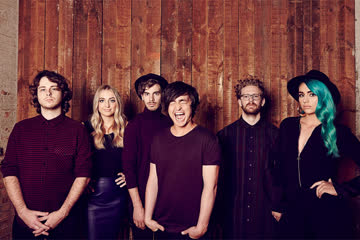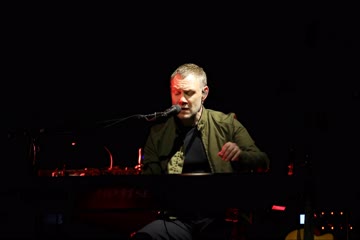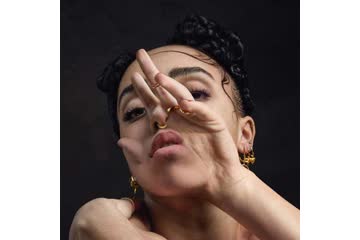Sharing Space With Spirits: Methyl Ethel’s Jake Webb On Creating ‘Are You Haunted?’
“It’s my hope that this music can reward people who wanna listen to it in a deeper way.”

Not dissimilar to fellow Perth polymath Kevin Parker (Tame Impala), songwriter, producer, vocalist and multi-instrumentalist Jake Webb records solo as Methyl Ethel but fronts a full band onstage. We’re all well aware that Western Australia boasts a bloody strong music scene and another of the region’s shining stars, Stella Donnelly, became the first additional singer to feature on a Methyl Ethel track with the release of their single, Proof – a shiny, pulsing track that questions “what constitutes reality in the post-Trump, post-climate-crisis, post-COVID era, in which science and fiercely-guarded fantasy go head to head in the realm of public discourse”. The song’s chorus dares listeners to, “Take a chance on proof (if you want to)” – tongue firmly in cheek.
Little known fact: Donnelly was actually Methyl Ethel’s touring guitarist at one point. “She came on a tour with us,” Webb confirms, “I think it was Groovin The Moo or something, and played all those shows with us. It was a very fun tour, that one.”
The first song Webb wrote for new album Are You Haunted? was Castigat Ridendo Mores, which kinda sounds like one of Hermione Granger’s spells but is actually a Latin phrase that embodies the essence of satire (translation: “he corrects customs by ridicule”). This song boasts an extended piano outro that’s guaranteed to make you feel like you’re levitating and when told it’s also this scribe’s absolute favourite album track at present, Webb graciously responds, “I’m glad. I love it too, yeah. And the reference to satire was a perfect fit, because the choice of the Latin phrase for the title – which is also sung in the song – was to very outwardly be pretentious and also tongue-in-cheek at the same time. Because it is just so funny to take things too seriously, I think. So it’s just a kind of twisted thing there.
“I worked on that song for the longest time as well, because after we realised we weren’t gonna leave the state for a while [due to WA’s ongoing border closure] I didn’t feel the necessity to rush anything and so, yeah! [Castigat Ridendo Mores] really did set the tone for how I wanted the rest of the record to sound.”
Don't miss a beat with our FREE daily newsletter
Gently cascading piano melodies and stately chords act as recurring motif throughout Are You Haunted?, which Webb confirms was a deliberate compositional choice: “For me, the image of the record is this lone person sort of sitting in a room at this upright piano and just playing expressively, bits and pieces. Everything that happens in the music sort of happens in that person‘s head and so it’s kind of just like this internal symphony. And that’s the image that I wanted to have throughout the whole record. It’s kinda cheesy, but I think it’s kinda nice.” Webb suddenly goes silent, before apologising, “Sorry, I’m eating a biscuit at the moment so if you hear me chewing...” What kind of biccie? “Oh, I think it’s maybe an Anzac biscuit.” Classic choice.
Resplendent with a glitchy hook that’s now permanently lodged in our internal jukebox, Are You Haunted?’s lead single, Neon Cheap, dropped back in April, 2021. And it takes several listens to decipher this song’s innovative chorus phrasing (“Who's that per-son that ca-nnot be put/ In-to a categ-ry…”). When we share our love of this kind of payoff, after obsessing over a song, Webb enthuses, “HA! I’m so happy to hear you say that, that’s so funny. You know, that’s why I’m so happy that we’re putting out the lyrics for this record. Because I fully agree with you and I think there is a beautiful thing about misheard lyrics – I think they’re called mondegreens – and kinda leaning into that sometimes is really good but, yeah! I would love for people – if they are interested – to really read the lyrics, especially for this record, because there is a lot of thought that goes into it even though sometimes it does seem to be just abstract; it’s definitely written purposefully, every word.
“I kinda also think you don’t need the lyrics to enjoy the music and vice versa, you know. Because I definitely feel like at times – or even on first listen sometimes – you can’t really get the whole picture straight away but, yeah! It’s my hope that this music can reward people who wanna listen to it in a deeper way.”
During a discussion about how rewarding, and freeing, listening to songs sung in a language other than your own can be, Webb offers, “I mean music is its own language, isn’t it? It does do all the work that it needs to do without, I guess, that extra cerebral level of having to make sense of the words. And sometimes maybe [lyrics are] even distracting and can pull you out of some kind of suspension if you’re trying to make sense of a story or something.”
"I still am, to this day, really grateful to be able to work out of there.”
But somehow Webb’s vocals never distract in that way, instead gliding over instrumentation like a bonus transcendental gossamer layer. Similarly to when Joe Goddard of Hot Chip’s ethereal falsetto elevates one of their bangers, Webb’s vocal delivery transports listeners to another dimension. “I’m glad that that’s the sense that you get from it, because that’s certainly what I would be trying to achieve; I’m glad that’s what it feels like,” Webb admits. “Because it’s definitely hard, like, where does the human voice live in a lot of these worlds? When we talk about not wanting to break the spell of the song, or the instrumental, if [the vocal] doesn’t quite sit in the right spot it can change the feeling entirely.”
To create Are You Haunted?, Webb returned to where Methyl Ethel began: Fremantle Recording Studios. “A dear friend of mine recently passed away, the studio is his,” he details in the album presser. “I spent many years of experimentation with him, learning so much looking over his shoulder. It feels special to continue to share the space with his ghost, I’m still learning from him.”
Webb is referring to the music producer and Fremantle Recording Studios founder with whom he formed the acid-pop four-piece, Sugarpuss, in 2009: Brian Mitra, who crossed over to the other side way too soon aged just 30. “This is somebody who is always present when I’m working on music and someone who is remembered really often through the bits and pieces of things that I do,” Webb explains. “Because starting out together and him being kind of a playful experimenter – yeah! It was really special to be able to be back in that room and I still am, to this day, really grateful to be able to work out of there.”
Given that it was Mitra who initially gave Webb “the push” that he needed to start composing and releasing music on his own, we can’t help but wonder whether returning to this space made him revisit the hopes and dreams he had for Methyl Ethel back then. “I mean, it was easy to do and that definitely happened because the room that I am set up in is where I recorded the first songs for this project. So I remember it very vividly. To be able to look back on things, and for it to be enjoyable to think of your younger self and things that you did in the past – I feel lucky to be able to look back and have had such positive experiences.”
"It just feels like it’s kind of traumatic, you know?"
So did Webb go so far as to imagine the kinds of things Mitra would suggest, or the feedback he’d offer about songs in progress while he was creating Methyl Ethel’s fourth record? “Yeah, absolutely. Certainly in working in this room – and even just, like, being present with him in my mind, in the space – is enough to kind of really make manifest something physiological.
“I mean, he’s probably the only person who I ever really wrote a song or wrote music with in that Lennon/McCartney kinda really split down the line way. Not that I’m considering us to be anywhere close to the Lennon/McCartney partnership, but anyway…” he trails off, laughing. “So, yeah! I used to think of what he would say, but really it got to the point where he was just so encouraging of everything I was doing. And he taught me a bunch of stuff.”
When asked whether he’s watched The Beatles: Get Back doco yet, Webb replies, “Yeah, I’ve just been watching it recently. It’s really funny, ‘cause I feel like for anyone who’s tried to write music – or to get something together with a group of people in that way – it’s the same; it just feels like it’s kind of traumatic, you know? Watching just how much of a shambles things are [laughs]. But really just how much joy people get out of playing music in the same room together.” Does the realisation that even legend-status bands such as The Beatles struggle with the same sort of issues while collaborating feel comforting, in a way? “Yep, yep, 100%.”
Of his solo songwriting approach, Webb shares, “It feels less like William Blake, ‘On a cloud I saw a child,’ and more, I suppose, like the marble sculpture is inside the giant block and all I’m doing is just toiling, getting rid of what isn’t the sculpture, you know? Until it just becomes what it is.
“I go in to do the work and then, I guess, the magic just sort of happens at some point; almost like I have to tire myself out with the drudgery of anything to then sort of find what the record is.
“I want what I work on to sort of make itself and I want to just perhaps be the conductor; or trying to wrangle something wild, something that becomes what it becomes. And not really do too much linear thinking through it all, if that makes sense. So I think in a way, for me, having a clear idea is a bit of a kiss of death in terms of creating anything interesting.”
Rather than relating to physical spaces, Webb reveals his use of the word “haunted” in this album’s title “is more as far as the feeling of memories being something that you kinda can’t escape from. And if you think about the idea of trauma, it really is something that can haunt you for your whole life and really affect who you are, who you kind of become, right? So those personal traumas, those collective traumas that are just carried around by everybody everywhere they go. And so I was sort of wanting to play around with that idea.”







